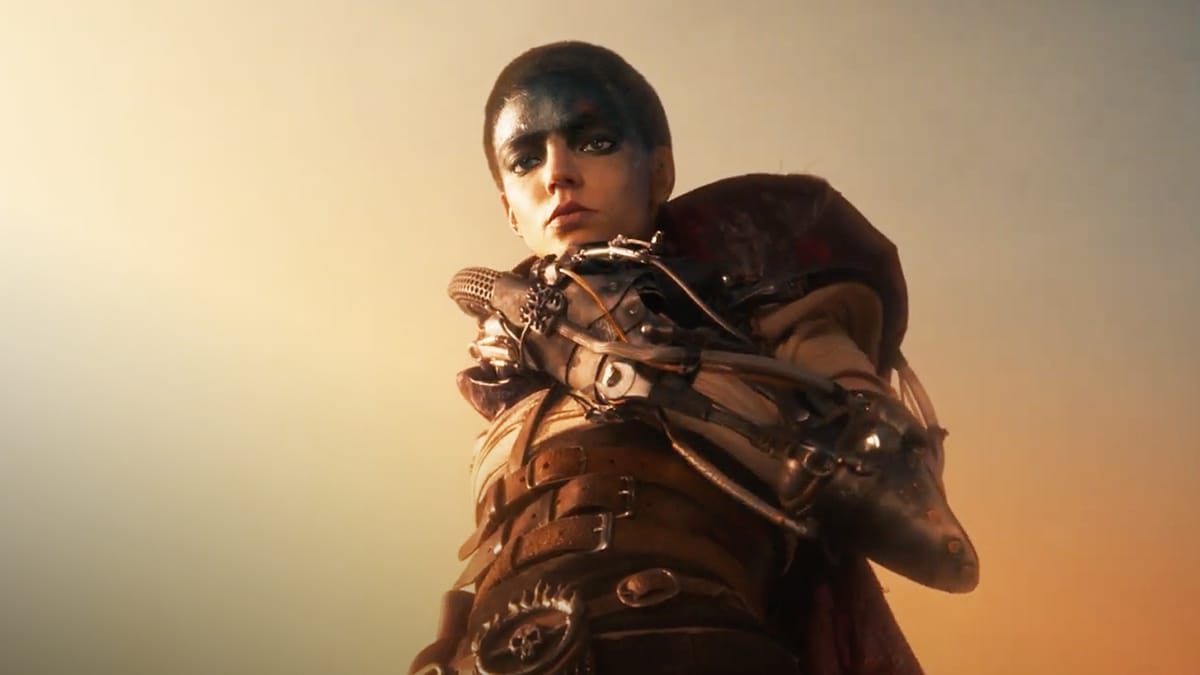Thoughts on Furiosa
There's something nihilistic about George Miller's fifth Mad Max movie and it's got me thinking...

I went to see Furiosa in the cinema this evening. I don't go to the cinema much these days, partly due to the cost (tickets tonight were £18.50, which feels like a lot) but mostly because the cinema doesn't have a pause button and I really struggle to get through a 2+ hour movie without needing a piss. But Fury Road really benefitted from the big screen and big speakers so I dehydrated all afternoon, endured the adverts (seriously, adverts at that price?) and settled in.
Usually I'd go to see a film like this with my peers, say Tom or Jez, 50-something chaps whose formative years were spent consuming the same trash media as myself. But they no longer live in Birmingham and I found myself in the cinema with three friends who are in their 30s. Which didn't seem like a big deal until we came to chat about it on the train home.
Furiosa is a distinctly old fashioned film. It feels a lot like the original Mad Max, or at least I think it does as I haven't that one for a good couple of decades. I'll probably be watching it this week. It's notable that Fury Road didn't make me want to revisit 70s and 80s low-budget action cinema – it was more of a self-contained, self-referential capsule. Furiosa feels like it's referencing loads of stuff, and none of it recent.
Which isn't that unusual. All modern commercial cinema is strip-mining the past because it's all IP regurgitation at this stage of late capitalism no future Mark Fisher etc you know the drill by now. But I do think George Miller is doing something else, and I think it comes down to a kind of nihilism that was rampant in the cinema of his era.
There's something Lydia Lunch says in the documentary about her life and work, The War is Never Over, which I finally watched last week.
What appears to be so nihilistic about that period is we were products of our generation, meaning, the Vietnam War, Kent State, the Summer of Love being buttfucked by the summer of hate and Mason, Nixon, Watergate. We felt the sixties failed us, our parents failed us, the country failed us. So we came together as a rallying force to document, as exorcism, the dilemmas we were living at the time.
She's talking about the No-wave industrial noise punk scene of the 70s but I think that sort of vibe can be found across low- and no-budget art of that time, especially trash and exploitation cinema. This sort of movie-making informed the cinema of my teenage years in the late 80s and early 90s, whether celebrated on shows like Moviedrome or simply being the training ground of the directors whose work I loved.
I'm reluctant to draw clear lines, but I think there's something distinct about that era of cinema and the cinema of the 2000s. Not better or worse, but different. And I think George Miller effectively making the same film five times across five decades years might help us to figure it out.
As is clear from the trailer, Furiosa is a revenge movie and plays hard into that genre. She's fuelled by her need to destroy Dementus, the man who destroyed her life, and it's no great spoiler that the movie ends with her getting that revenge, because of course it does. But there's no catharsis, no happy ever after.
The film gives us this narrative that Furiosa has been stolen from the utopia of the Green Place and thrust into this hellscape of evil violent men. But they all had their 'green place' taken from them which they're desperate to get back, by whatever means necessary, mostly violent subjugation, messianism and the hoarding of resources. None of them are good people, but there's a hint that maybe they were once, before it all went to shit.
Being a prequel we know Furiosa is going to survive so the stakes are less how she wins but what she wins. And in my reading she wins very little. Her victory is against someone who has also lost everything and who is trying to find his way back to some semblance of civilisation. When he's not scheming and fighting to survive, Dementus is obsessed with culture and language. His use of the word "piquant" which amuses Mark Kermode so much is hilarious, but in hindsight quite poignant and a little sad.
And I'm remembering now how in the middle of the ugly Gastown oil refinery the guy in charge is copying John Waterhouse's Hylas and the Nymphs from a book onto a giant mural, and how jarring that was, that someone whose job is to keep the death machines rolling spends their spare time recreating beauty.
Fury Road was such a non-stop rollercoaster of a movie that it doesn't have time to be about anything other than what's right there on the surface. But Furiosa is a slower story, told over many years, and left me wondering what it was saying, beyond the world-building and fleshing out her backstory.
There's nothing particularly empowering about Furiosa's journey. She survives and prepares for the events of Fury Road, but we know they're going to just lead her back to where she started. The whole thing feels weirdly futile and dispiriting, to watch this young girl turn into a young woman who keeps the spark of hope from the place she was violently taken from but where we know she can never return.
If the gods of Hollywood accounting are willing, there's due to be another Mad Max film. If it's a sequel to Fury Road and it features Charlize Theron's Furiosa, based on the events of those first two films I'd fully expect her to go full baddie. Fury Road ended with a hint of optimism as all the baddies were dead and Furiosa now the boss. But that's not how these films work. There's no happy ending. You can never go home. The dream is dead.
If there's a message to these films it's not about how great struggle is rewarded with peace. I think it's more of a warning of what we have to lose right now lose, and how once it's too late we will never get it back. How the world is fragile, both ecologically and socially, and when it's broken then it's broken. Furiosa is a very funny movie – Chris Hemsworth is clearly having a ball – and the violence is cartoonish. But it's also a very sobering film, especially in its conclusion. I was expecting to come out pumped and buzzing but I was strangely subdued.
I'm looking forward to seeing it again.
I thought I'd reference the Weird Studies episode on Mad Max but I didn't fancy wading through 90 minutes of audio to find the bits I remember being interesting – oh for a transcript, or copies of the notes they're clearly reading from. I do recall it being a good episode though and worth your time.



